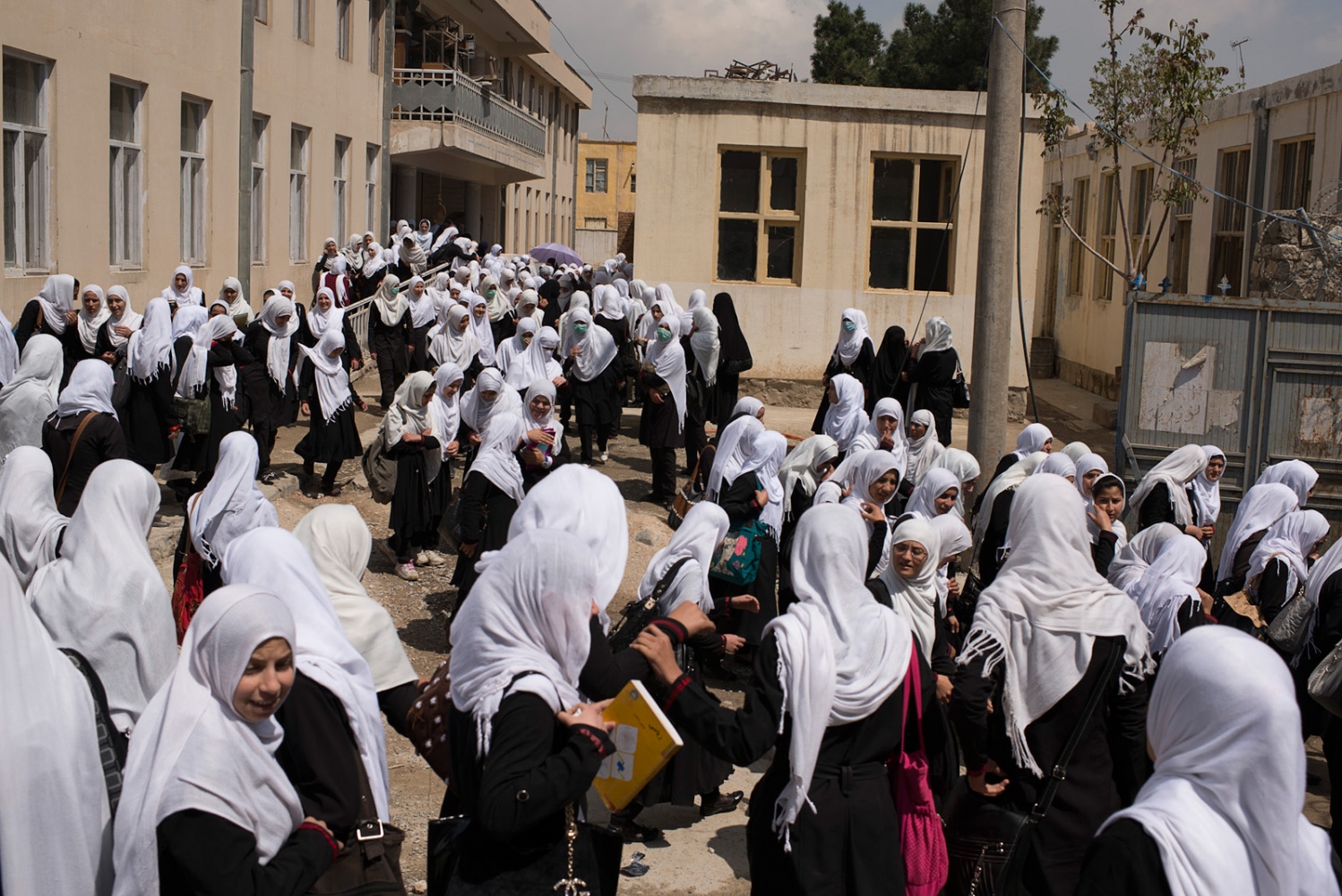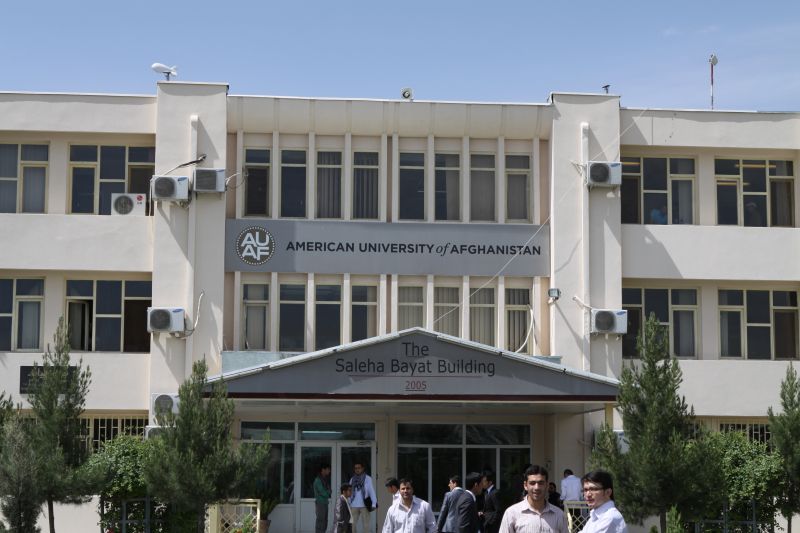By Samira Abrar
Editor’s note: Samira Abrar is a graduate of American University in Kabul, Afghanistan, with a degree in law. She has worked for USAID-funded rule of law projects and the MEC Anti-Corruption Committee in Afghanistan for several years, supporting Afghan court systems. Samira also has worked with CODEPINK: Women for Peace as a social media campaign manager and now works on CODEPINK’s Divest from the War Machine campaign team.
Special thanks to documentary photographer Kiana Hayeri for permission to use her photograph of Afghani school girls, which appears as part of her series Born in War, as the featured image for this piece. Learn about and support Hayeri’s work here.
[dropcap]T[/dropcap]ribal warfare. Gunfire and bombs bursting. Flight from your homeland. Change of homes. Different schools. Difficult choices. And nonstop new beginnings.Life-altering change has been the one constant in my life. At age 24, I already have lived in five countries and eight cities.
I was born in the midst of the Afghan Civil War, which was followed by the Taliban’s takeover of my hometown, Takhar. I grew up, went to school and worked in a never-ending warzone.
I was born into a house of women. I was 6 when we fled our home and country in the middle of the night, after a rocket blew up our neighbor’s house. We traveled over several months through a torturous journey and made it to Iran, where we had relatives and friends in a relatively safe community.
Sixteen years later, I was carrying my luggage past the big windows at a Los Angeles International Airport terminal. I realized that the plane had carried mostly migrants, all carrying white bags with “UNHCR” (United Nations High Commissioner for Refugees) signs. Curiously peering here and there, I recognized myself as the only young, solo woman among them. I knew no one in Los Angeles. Unaware of what was waiting outside or even what to expect in America, I watched the cheers, hugs and cries that met others from the plane. I had no idea what it was like to live without my family and without their emotional and financial support. In Afghanistan, women and girls tend to leave home to live separate from their parents only after marriage.
Resettling in the United States, I was fighting both external stereotypes about myself and internal ones about America and its people.

Growing Up as an Afghan Muslim Girl
[dropcap]G[/dropcap]rowing up as an “Afghan Muslim Girl,” certain things were too “boyish” for me, things like riding a bicycle, playing ball, swimming, being outside, and, of course, getting an education and having a career. Being a kid, I thought that was normal everywhere, and that I could do nothing about it. At the time, I wished I was a boy because boys had much more freedom, and a fun life.It wasn’t until I was 15, when I returned to live in Afghanistan, that I realized this inequality was all because I was living in a society where the rules undermined women’s rights and their participation in public life. As girls mature in adolescence, they had to wear a burqa when going out of the house, and it was nearly the time for me to wear one. Doing otherwise was regarded as a threat to fundamental religious and patriarchal traditions.
Wearing a burqa while commuting to school and going out of the house, I had an odd sense of something missing. But I no longer wished to be a boy. I felt the imbalance. I felt invisible. I wanted to liberate my womanhood as a strong identity, but I didn’t know how.
In 2009, the Afghan parliament approved an amendment to the Personal Status Law for Shiite Muslims (Shia Family Law). The law contained provisions requiring a woman to ask permission to leave the house except on urgent business, a duty to “make herself up” for her husband when demanded and a prohibition against refusing sex with her husband.
To me and many other women, these repressive conditions felt like a form of slavery. Protests began around the city, and one women’s rights defender, Sitara Achakzai, was killed.
Witnessing all of the injustice and abuses, something was happening inside me that I could not identify. Was it rage or self-pity? All I knew was that I needed to do something to help bring change.
Fresh from high school graduation, in Kunduz, Afghanistan, I started working as a translator, helping women who were seeking legal support from international human rights organizations. It was evident that man-made laws silenced women, undermining women’s rights. That’s when I discovered my passion: to go to law school.

Finding My Place as a Student Leader
[dropcap]A[/dropcap] year and a half into law school at the American University of Afghanistan, I found myself publicly advocating for change. I had become the first and only woman to ever run for president of the Student Government Association. Much shorter than the men surrounding me, I had to shout to have my voice and the voices of other female students heard. A woman representing a male-majority student community? I was told it was nearly impossible, and I was treated with contempt by some other candidates.When I climbed to the podium at the debate, my presence and speech took them by surprise. Some gave me mocking smiles, and some merely looked confused. I had broken with traditional campaigning by hanging my picture in banners all over campus and starting a social media campaign.
I won the election. The experience helped expand my horizons. Reading the social media comments brought new hope. “Fantastic! Good to have a female president on campus and looking forward to seeing a female president in Afghanistan.” I had done what others had said was impossible.
In my last year of university, the Taliban stormed the campus. In an evening attack that lasted more than 10 hours, more than a dozen students and a professor were killed. Many others were injured with gunshot wounds and shrapnel.
During the attack, after being trapped in the library, fearing for my life, I and a group of students were able to escape through a window and run through the dark. We found our way off the campus by breaking through an emergency door to a main street.
Two weeks after the attack, with the campus shut down, while I was still traumatized and seeking to heal, I traveled to India to join my family.
Three weeks later, I traveled to the U.S on a Special Immigration Visa. In America, I hoped to pursue my law career. But I found myself dealing with the anxieties of migrating. I had embarked on a journey to become a stronger version of myself as a woman, and as a women’s rights activist.
Life as a Young Woman in America
[dropcap]B[/dropcap]eing in America threw me into a society culturally and vastly different in every way, especially in terms of women’s rights and women’s participation in community. I could see that women are not invisible. We have a presence, and that presence is strong.Having said that, for the most part, I felt like I was juggling two lives, trying to make the new place home and forge new connections, yet also trying to stay connected with people and events “back home.”
I start my day checking on my family and loved ones in Kabul, catching up with projects that I still remotely do in Kabul, keeping up with what’s happening in the country, and constantly communicating across multiple time zones.
My change is about more than geography. I have regular eye-opening experiences, as well as the confusions, doubts, misunderstandings, fears, and revisiting of all the choices I have ever made in life.
I had to find my place as an Afghan Muslim young woman in this country and deal with the adjustments that came along with the social and professional integration, particularly at a time when things started to get terrifying with the new immigration policies.
For me, the key to the whole experience has been to embrace the spirit of change. Over the course of my work with grassroots peace and justice organizations in the U.S., I have connected with people from different walks of life. They have compelling stories of how they had to leave their countries and former life, and never abandoned their commitment to justice and peace.
There is comfort in shared experiences. Sure, being an immigrant brings anxieties. Yes, there are steep roads on the way. But persistence and an enduring spirit of not giving up gives you the opportunity to know yourself better and grow into being a global citizen.

I think back to my beginnings, of fighting for my right to be educated, to be heard, and to advocate for other women. Now, everything I have done so far makes perfect sense to me. If I had not taken those steps, taken risks, and embraced the spirit of change, I would not be the woman I am today.
I kept my dreams alive. I have fled my country and my former life, yet I never have abandoned my hope and dreams of change for a better and more just world.
Our Community Based News Room publishes the stories of people impacted by law and policy. Do you have a story to tell? Please contact us at CBNR. To support our Community Based News Room, please donate here.




